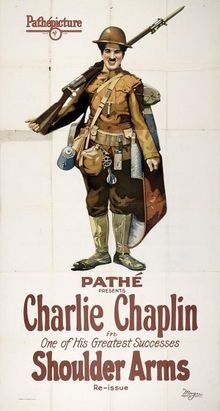 One of the other short films I saw at the Carolina Theatre's recent Charlie Chaplin retrospective was Shoulder Arms, his second film for First National Pictures following A Dog's Life. To say they're completely different films with little in common would be putting it mildly. Whereas the latter is an optimistic and light-hearted comedy, Shoulder Arms is a much more cynical film about a very heavy issue: war. Released during the later part of World War One, it would be his most popular film yet, both commercially and critically.
One of the other short films I saw at the Carolina Theatre's recent Charlie Chaplin retrospective was Shoulder Arms, his second film for First National Pictures following A Dog's Life. To say they're completely different films with little in common would be putting it mildly. Whereas the latter is an optimistic and light-hearted comedy, Shoulder Arms is a much more cynical film about a very heavy issue: war. Released during the later part of World War One, it would be his most popular film yet, both commercially and critically.
The film opens with Chaplin playing an army recruit in training camp. He seems completely unsuited for the military, unable to handle a gun properly and even having trouble marching. After a hard day of training, he returns to his tent and collapses on the bed, exhausted.
The next scene finds him in the trenches in the heat of battle. The comedy in this portion of the film revolves mainly around the harsh conditions faced by American soldiers - using jokes to shed light on the horrors of war. For example, in one slighty melancholic scene, he receives no letters from home, and must resort to secretly reading another soldier's correspondence behind his back. Another gag involves the one package he does receive from home: a container of limburger cheese. Good thing the army has plenty of gas masks lying around! His living quarters are flooded, leaving he and his bunkmates to sleep underwater using straws to breathe. And that's not the worst of it - there's still actual combat to look forward to. Although it's implied our hero is quite a good shot and capable of taking out more than a few of the enemy, at one point the fighting is so intense that he holds up a cigarette and lights it with a passing bullet. Explosions are frequent, and the air is filled with the sound of gunfire. Chaplin's message is clear, despite the slapstick antics: war is a terrible experience, no matter what news reel propaganda might have you believe.